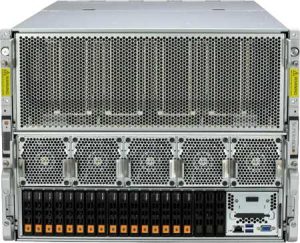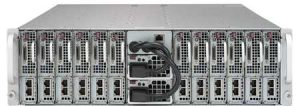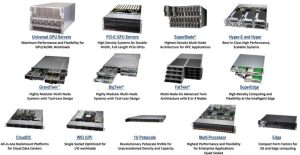Supermicro Rack Scale Solutions with 5th Gen Xeon Processors
Optimized for AI, CSPs, storage, and edge computing
This is a Press Release edited by StorageNewsletter.com on December 21, 2023 at 2:01 pmSupermicro, Inc. announces rack scale air and liquid cooled solutions based on the X13 family of workload-optimized servers now support the 5th gen Intel Xeon processors (formerly codenamed Emerald Rapids).
This product lineup includes GPU servers for Generative AI, throughput and latency-optimized E3.S Petascale servers, cost-effective high-density enterprise and simply double storage servers for large-scale object storage, and a new 4-node SuperEdge systems with enhanced storage capacity.
“At Supermicro, we leverage workload-optimized server building blocks to create fully integrated Rack Scale Solutions for our customers, resulting in accelerated delivery times and supporting up to 100kW per rack and a global manufacturing capacity of 4,000 racks per month,” said Charles Liang, president and CEO. “Add to this Supermicro’s own rack-scale liquid cooling solutions, which can deliver green computing TCO savings of up to 51% on data center electricity costs, for a complete and integrated solution. We are already shipping early units to customers worldwide. Supermicro X13 product families are the industry’s broadest range of servers optimized for AI, cloud, storage, and the edge, and it gets even better with support for the new 5th gen Intel Xeon processors, which bring increased performance-per-watt, up to 128 cores and 160 PCIe lanes in a single server.“
The X13 systems take advantage of the new processors’ built-in workload accelerators, enhanced security features, higher core count, more last-level cache, and increased performance within the same power envelope as the previous-gen of Xeon processors. The 5th gen Xeon processors provide a 36% (3) higher average performance/watt across workloads vs. 4th gen Xeon Scalable processors.
The Intel Trust Domain Extensions (Intel TDX) are built into the CPU die. Supermicro X13 systems also include firmware protected hardware root of trust (RoT) compliant with NIST 800-193, as well as benefiting from the firm‘s supply chain attestation and Made in the USA program for added security from production to end customer.
“5th gen Intel Xeon processors deliver meaningful performance and efficiency improvements for our customers’ most important workloads,” said Lisa Spelman, corporate VP and GM, Xeon products and solutions, Intel Corp. “Supermicro’s X13 range of servers are designed to give customers the fastest path to increased performance given their compatibility with 4th gen Xeon based platforms already in the market.“
Data Center GPU
Among the additions to the broad X13 server range is a dual processor GPU server with 8xIntel Data Center GPU Max 1550 OAM GPUs optimized for large-scale AI training, generative AI, and HPC applications. The Data Center GPU Max 1550 GPUs utilizes the open-standard Open Accelerator Module (OAM) form factor for flexible high-speed interconnect and contains 128GB of HBM2e memory for a maximum GPU memory bandwidth of 3276.8 GB/s. Both CPU and GPU direct-to-chip liquid cooling are available on the system via the company‘s complete rack integration and liquid cooling solutions. (see Supermicro system with 8 Intel Max 1550 GPUs).
Microcloud 5039MS-H12TRF front
The company is also launching several new servers supporting the Xeon E-2400 processors (formerly codenamed Catlow Platform, Raptor Lake-E). These systems are optimized for maximum efficiency edge and cloud workloads and include the I/O flexible WIO, storage-optimized, short-depth, and mid-tower configurations, as well as multi-node firm’s MicroCloud and MicroBlade architectures. The Xeon E-2400 processors have up to 8 cores and a top frequency of 5.6GHz. These servers are available for shipping.
The company’s portfolio of X13 systems are performance optimized, energy efficient, incorporates improved manageability and security, supports open industry standards, and is rack-scale optimized.
Performance optimized
- Support for 5th gen Xeon processors up to 64 cores and 350W TDP (air cooled) or 385W (liquid cooled) as well as the most performant current-gen PCIe, OAM, and SXM GPUs.
- Support for DDR5-5600 memory, which speeds up data movement to and from the CPUs, improving execution times.
- Support for PCIe 5.0, which doubles the bandwidth to peripherals, reducing communication time to storage or hardware accelerators.
- Support for Compute Express Link (CXL 1.1) allows applications to share resources, enabling applications to work with much larger data sets than ever before.
- Built-in Intel Accelerator Engines for workload-specific acceleration. These include Intel AMX for AI, Intel DSA for networking and storage, Intel IAA for memory-bound applications, Intel DLB for load balancing, and Intel vRAN Boost for increased efficiency on mobile network workloads.
- Intel Trust Domain Extensions (Intel TDX) will be generally available with 5th gen Intel Xeon processors.
- AI and Metaverse-ready with a range of powerful GPUs.
- Support for multiple 400Gb IB and DPU enables real-time collaboration with low latencies.
Energy efficient – Reduces datacenter Opex
- The systems can run in high-temperature data center environments up to 35°C (95°F), reducing cooling costs.
- Many system SKUs configuration can support up to 42°C for free-air cooling and many other SKUs support liquid cooling options.
- Support for multiple airflow cooling zones for maximum CPU and GPU performance.
- In-house design of Titanium level power supplies ensures improved operational efficiency.
Improved security and manageability
- Intel TDX is available on 5th gen Xeon for hardware-based trusted execution environments to facilitate the deployment of trust domains for hardware-isolated virtual machines.
- NIST 800-193 compliant hardware platform Root of Trust (RoT) on every server node provides secure boots, secure firmware updates, and automatic recovery.
- 2nd-gen Silicon RoT, designed to include industry standards, opens up opportunities for collaboration and innovation.
- Open industry standards-based attestation/supply chain assurance from motherboard manufacturing through server production to customers. Supermicro has cryptographically attested the integrity of each component and firmware using signed certificates and secure device identity.
- Run-time BMC protections continuously monitor threats and provide notification services.
- Hardware TPMs provide additional capabilities and measurements needed to run systems in secure environments.
- Remote Management built on industry standard and secure Redfish APIs enables integration of Supermicro products into existing infrastructure.
- A software suite that enables rack management at scale for IT infrastructure solutions deployed across the core to the edge.
- Integrated and verified solutions with 3rd party standard hardware and firmware enable the best out-of-the-box experience for IT administrators.
Support for open industry standards
- EDSFF E1.S and E3.S storage drives provide a future-proof platform with a common connector for all form factors, a range of power profiles, and improved thermal profiles.
- OCP 3.0 compliant Advanced IO module (AIOM) cards, which will provide up to 400Gb/s bandwidth based on PCIe 5.0.
- OCP Open Accelerator Module Universal Base Board Design for the GPU complex.
- Open ORV2 and ORV3
- Open BMC and Open BIOS (OCP OSF) support on select products.
The company will offer early access availability of X13 systems powered by 5th gen Xeon processors to qualified customers through its remote JumpStart and Early Ship programs. The firm’s JumpStart program allows qualified customers to perform workload validation with the new company’s systems.
X13 portfolio includes following:
Click to enlarge
- SuperBlade – firm’s high-performance, density-optimized, and energy-efficient multi-node platform optimized for AI, data analytics, HPC, cloud, and enterprise workloads.
- GPU Servers with PCIe GPUs – Systems supporting advanced accelerators to deliver performance gains and cost savings. These systems are designed for HPC, AI/ML, rendering, and VDI workloads.
- Universal GPU servers – Open, modular, standards-based servers that provide performance and serviceability with GPU options, including the latest PCIe, OAM, and NVIDIA SXM technologies.
- Petascale storage – Leading storage density and performance with EDSFF E1.S and E3.S drives, allowing capacity and performance in a single 1U or 2U chassis.
- Hyper – Performance rackmount servers are built to take on the most demanding workloads along with the storage and I/O flexibility that provides a custom fit for a range of application needs.
- Hyper-E – Delivers the power and flexibility of firm’s Hyper family optimized for deployment in edge environments. Edge-friendly features include a short-depth chassis and front I/O, making Hyper-E suitable for edge data centers and telco cabinets.
- BigTwin – 2U 2-Node or 2U 4-Node platform providing density, performance, and serviceability with dual processors per node and hot-swappable tool-less design. These systems are for cloud, storage, and media workloads.
- GrandTwin – Purpose-built for single-processor performance and memory density, featuring front (cold aisle) hot-swappable nodes and front or rear I/O for easier serviceability.
- FatTwin – Advanced, high density multi-node 4U twin architecture with 8 or 4 single-processor nodes optimized for data center compute or storage density.
- Edge servers – High-density processing power in compact form factors optimized for telco cabinet and edge data center installation. Optional DC power configurations and enhanced operating temperatures up to 55°C (131°F).
- CloudDC – All-in-one platform for cloud data centers, with flexible I/O and storage configurations and dual AIOM slots (PCIe 5.0; OCP 3.0 compliant) for maximum data throughput.
- WIO – Offers a range of I/O options to deliver optimized systems for specific enterprise requirements.
- Mainstream – Cost-effective dual processor platforms for everyday enterprise workloads
- Enterprise storage – Optimized for large-scale object storage workloads, utilizing 3.5″ spinning media for high density and TCO. Front and front/rear loading configurations provide easy access to drives, while tool-less brackets simplify maintenance.
- Simply double – Enhanced density large-scale storage servers with a dual-tier design for convenient front access, with up to 24×3.5″ drives in a 2U chassis.
- Workstations – Delivering data center performance in portable, under-desk form factors, Supermicro X13 workstations are for AI, 3D design, and M&E workloads in offices, research labs, and field offices.
(1) See Supermicro Servers Excel At Various Benchmarks with 5th Gen Intel Xeon Processors for detailed information.
(2) Average performance gain as measured by the geomean of SPEC CPU rate, STREAM Triad, and LINPACK compared to 3rd gen Intel Xeon processor. See G1 at intel.com/processorclaims: 5th gen Intel Xeon Scalable processors. Results may vary.
(3) Geomean of ‘DeathStar Bench- Social Network, MySQL Database, OpenFOAM, ResNet34 Inference, VPP-FIB. This offering is not approved or endorsed by OpenCFD Limited, producer and distributor of the OpenFOAM software, and owner of the OPENFOAM and OpenCFD trademark. See backup for workloads and configurations. Results may vary.

















 Subscribe to our free daily newsletter
Subscribe to our free daily newsletter


